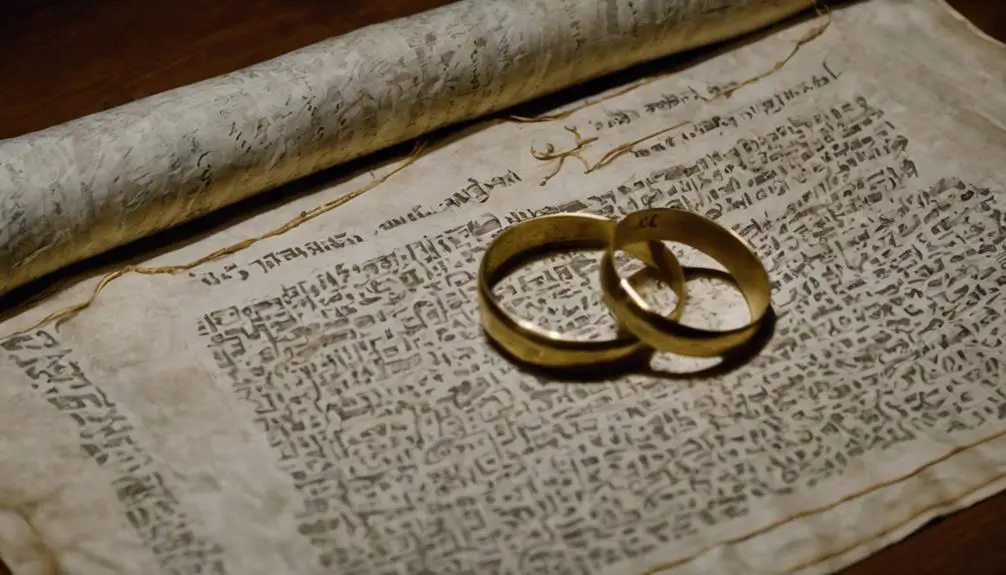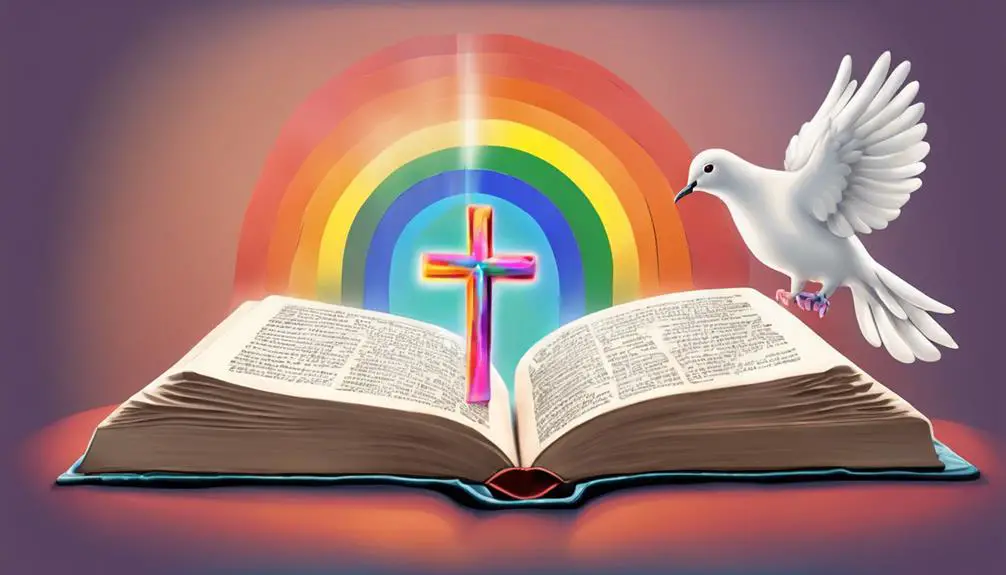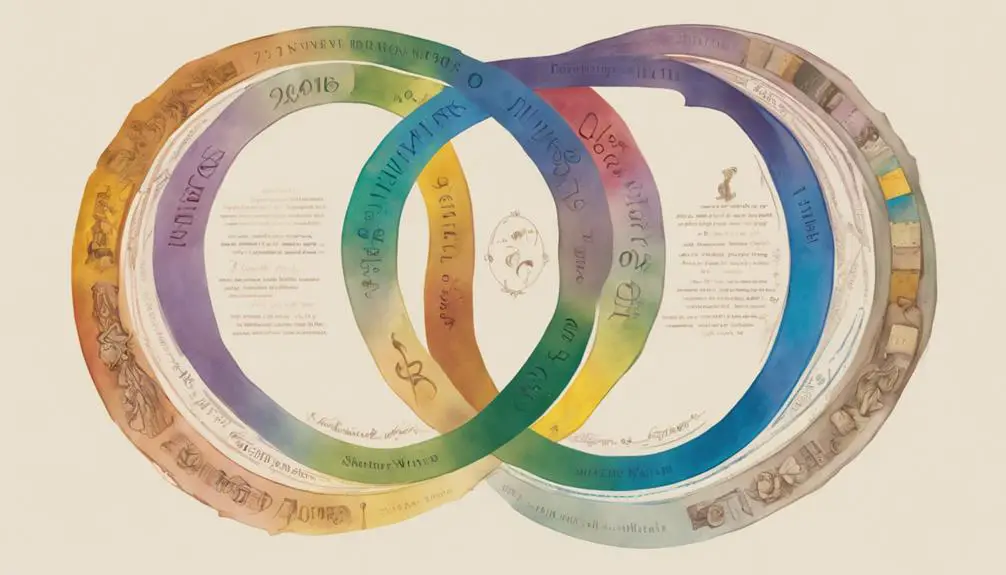An in-depth exploration of biblical verses potentially referencing gay marriage, offering fresh perspectives on faith, spirituality, and societal norms.

Are There Any Verse in the Bible About Gay Marriage
Imagine flipping through the worn, sacred pages of the Bible, seeking answers about gay marriage. You're wondering if there's a verse, a phrase, or even a single word that directly refers to it.
This question isn't just about curiosity, it's about a deeper understanding of faith, spirituality, and societal norms.
As you continue this exploration, you'll navigate through complex interpretations and diverse perspectives that might just redefine your comprehension of holy scriptures.
Key Takeaways
- There are no explicit verses in the Bible concerning gay marriage.
- Interpretations of biblical passages about homosexuality are shaped by historical, cultural context and original languages.
- The Bible's condemnation of homosexuality is often rooted in specific contexts, not necessarily applicable to loving, consensual same-sex relationships.
- Modern interpretations emphasize themes of love and acceptance, questioning traditional views and supporting gay marriage in some denominations.
Understanding Biblical Context

To fully grasp the biblical verses concerning gay marriage, you'll need to first understand the historical and cultural context in which the Bible was written. The Bible's authors wrote in a time and place vastly different from ours. Concepts that we take for granted, like democracy, human rights, or even romantic love, weren't conceptualized in the same way back then.
Moreover, you must consider the original languages, Hebrew and Greek, in which the Bible was written. These languages are replete with nuances and subtleties that may not translate seamlessly into English. Therefore, you can't simply take an English translation at face value.
Furthermore, it's crucial to understand that the Bible's authors had cultural biases. These cultural biases inevitably shaped their worldviews and by extension, their writing. This isn't to discount the Bible's spiritual authority, but rather to acknowledge its human element.
Lastly, remember that the Bible isn't a monolith. It's a compilation of different books, written by different authors, at different times, for different audiences. Each book has its unique purpose, context, and style. Therefore, you must interpret each verse within its specific context.
It's only with this understanding that you can accurately interpret biblical verses about gay marriage.
Examining Old Testament Passages

Let's delve into the Old Testament, examining passages that have been traditionally interpreted as addressing homosexuality. Specifically, you'll find two verses in the book of Leviticus (18:22 and 20:13) that are often cited in discussions on this topic. These passages describe male same-sex relations as an 'abomination'. However, it's crucial to remember that the term 'abomination' in the original Hebrew context had a broad usage, including non-sexual acts such as eating shellfish or wearing mixed fabrics.
Another passage, Genesis 19, recounts the story of Sodom and Gomorrah. Some interpret the sin of Sodom as homosexuality due to the attempted male rape. Yet, many scholars argue that the focus of this narrative is on inhospitality and violence, rather than sexual orientation per se.
Lastly, in the historical books (1 Kings 14:24; 15:12; 22:46; 2 Kings 23:7), there are references to 'male cult prostitutes'. However, these texts seem more concerned with idolatry and religious purity, rather than a condemnation of homosexuality.
New Testament Perspectives

Shifting our focus to the New Testament, you'll find a handful of passages that can be interpreted as pertaining to homosexuality. The writings of Paul, particularly in Romans 1:26-27 and 1 Corinthians 6:9-10, have often been cited in this context. The language used, however, isn't explicit and leaves room for interpretation.
Paul's words in Romans describe behaviors that are 'against nature' and those who 'exchanged natural relations for unnatural ones.' While some interpret this as a clear condemnation of same-sex relations, others argue it's a critique of excess and lust, not of homosexuality per se.
In Corinthians, Paul lists behaviors that he suggests will prevent individuals from inheriting the Kingdom of God. Among them are 'malakoi' and 'arsenokoitai,' terms translated as 'homosexuals' in some versions of the Bible. Yet, the exact meaning of these Greek terms is debated among scholars.
You'll note that none of these passages explicitly mention or define the concept of gay marriage as understood today. Therefore, interpretations largely hinge on the broader context, the original language, and the socio-cultural nuances of the time. Remember, it's vital to approach these texts with scholarly rigor and an open mind.
Societal Interpretations Over Time

Over time, societal interpretations of these biblical passages have varied widely, reflecting changing cultural attitudes and understandings of sexuality and marriage. You'd find that during certain periods, strict literal interpretations were popular, leading to harsh social and legal penalties for homosexuality. As societies began to understand sexuality as a spectrum rather than a binary, interpretations of these passages also shifted.
The 20th century saw a radical change in societal attitudes towards homosexuality. This shift was largely due to increased awareness and understanding of sexual diversity. As such, many began to question whether traditional interpretations of these verses were accurate or fair. You'll find an increasing number of theologians and believers arguing that these passages have been misinterpreted or taken out of context.
While some Christian denominations continue to adhere to traditional interpretations, others have embraced more inclusive understandings of these passages. This has led to a broadening of attitudes towards gay marriage within Christian communities, with some denominations now openly supporting it. Keep in mind that this is a complex issue, with interpretations continuing to evolve in response to ongoing societal changes.
Navigating Religious Beliefs and Modernity

In the crossroads of religious beliefs and modernity, you may find that reconciling traditional interpretations of the Bible with contemporary views on homosexuality and gay marriage can present significant challenges. You're not alone. Many struggle to balance these often conflicting perspectives.
Remember, the Bible is a historical document, written in different times and contexts. Its interpretations have evolved throughout centuries, reflecting the morals, values, and understandings of various eras.
On the one hand, you have the traditional interpretation, which often cites verses deemed to condemn homosexuality. But it's also important to remember that interpretation can be influenced by historical context and cultural bias.
On the other hand, you have the modern perspective that emphasizes love, acceptance, and equality. It argues that the fundamental message of the Bible is love and that this should extend to all relationships, regardless of sexual orientation.
Navigating this dichotomy isn't easy. It requires deep reflection, open-mindedness, and a willingness to engage in dialogue. It's a journey that may challenge your beliefs but could also lead to greater understanding and empathy. This journey is integral to the co-existence of religious beliefs and modernity.
Conclusion
In interpreting the Bible's stance on gay marriage, you've seen that interpretations vary widely. Some cite Old and New Testament passages as evidence of disapproval, while others argue for a more nuanced understanding.
It's clear that societal interpretation has shifted over time. As you navigate the intersection of religious beliefs and the modern world, remember to approach this complex issue with an open mind and respect for diverse perspectives.



Sign up